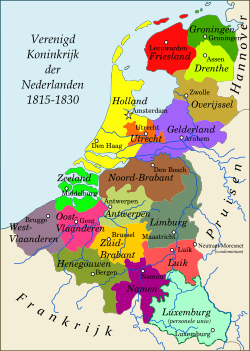Province of Limburg (1815–39)
| Province of Limburg Provincie Limburg Province de Limbourg |
|||||
| Province of the Netherlands | |||||
|
|||||
|
Coat of arms |
|||||
| The United Kingdom of the Netherlands with the Province of Limburg in greyish green. | |||||
| Capital | Maastricht | ||||
| Governor | |||||
| • | 1815–1828 | Charles de Brouckère | |||
| • | 1828–1831 | Maximilien de Beeckman | |||
| Legislature | States of Limburg | ||||
| History | |||||
| • | Established | 1815 | |||
| • | Treaty of London | 19 April 1839 | |||
Coat of arms
Limburg was one of the provinces of the United Kingdom of the Netherlands and later Belgium. The province existed for the duration of the United Kingdom, from 1815 to 1830, and for the first years after the Belgian independence, from 1830 to 1839. When King William I signed the Treaty of London in 1839, the province was split into a Belgian, and a Dutch part, the new Duchy of Limburg.
The territory of Limburg was the same as the combined territories of the present Dutch and Belgian provinces, with the exception of Voeren, which was a part of the province of Liège at the time. Its capital was Maastricht.
For legal matters, the province was subdivided into the arrondissements of Maastricht, Hasselt and Roermond.
In 1830, some 338,000 people lived in this province and in 1846, about 186,000 people were counted in the new, smaller province of Belgian Limburg.
Their main religion was, and still is, Roman Catholicism.
Following the Napoleonic Era, the great powers, United Kingdom, Prussia, the Austrian Empire, the Russian Empire and France, created a new United Kingdom of the Netherlands in 1815. A new province was formed from the former French Empire département of Meuse-Inférieure, excluding Niederkrüchten and Herzogenrath which were assigned to Prussia, and was to receive the name "Maastricht," after its capital. The first king, William I, who did not want the name of the former Duchy of Limburg to be lost, insisted that the name be changed to "Limburg." As such, the name of the new province derived from the old duchy that had existed until 1648 within the triangle of Maastricht, Liège, and Aachen.
...
Wikipedia


